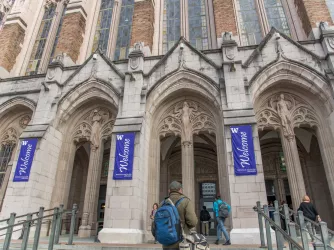Table of Contents
Lower the First Amendment flags to half-mast, in memory of Bruce E.H. Johnson (1950-2024) — First Amendment News 437
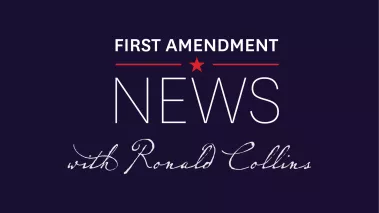
Exceptional, renaissance, extraordinary, and generous. A brilliant First Amendment lawyer with an uninhibited passion for his calling. My friend, and that of many others: Bruce E.H. Johnson (1950-2024).
Bruce’s unexpected passing weighs heavily on the hearts of those who knew this remarkable man; his intellect was amazing, his big-heartedness boundless, and he could also be profoundly witty.
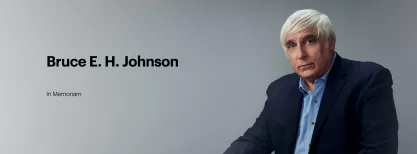
A first sampling of tributes to Bruce’s memory appears following this short introduction. Those contributing are Sandra Baron, the Davis Wright Tremaine law firm, Kelli Sager, Len Niehoff, Lee Levine, Robert Corn-Revere, Chris Finan, and David Skover.
On September 26, some of Bruce’s friends and colleagues will join in a First Amendment Salon tribute to him, which will be video-recorded and thereafter posted.
You could talk with Bruce about 18th-century sedition trials or 21st-century opera, and his knowledge (always expressed with grace) was extraordinary. You could engage him in the most nuanced forms of lawyer-talk and he’d hold his own and then some. And then there were all the impressive victories he scored in free expression and anti-SLAPP cases, along with the many scholarly articles he authored. See, for example, his “An Old Libel Lawyer Confronts Robotica’s Brave New World” in “Robitica: Speech Rights and Artificial Intelligence,” and “Commercial Speech and Free Expression: The United States and Europe Compared,” co-authored with Kyu Ho Youm for the Journal of International Media & Entertainment Law.
Even in his youthful years, Bruce signaled that his mind was wide in breadth and profound in substance:
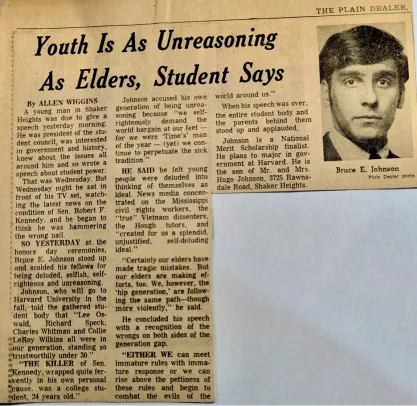
Though his manner was always humble, his credentials were quite impressive:
- A.B., Harvard College, 1972, magna cum laude, Phi Beta Kappa
- B.A., University of Cambridge, 1974, First Class Honours
- J.D., Yale Law School, 1977
- M.A., University of Cambridge, 1978
- Partner, Davis Wright Tremaine (1983-2024)
- Adviser on ALI’s Restatement of the Law Third Torts: Defamation and Privacy (2019-2024)
- Director, Seattle Opera (2015-2024)
Case in point:
- David Kroman, “Bruce Johnson, preeminent First Amendment lawyer, dies,” Seattle Times (Aug. 26)
In 1989, CBS’ “60 Minutes” aired a segment on the use of the chemical agent Alar by Washington apple growers. The piece, called “A is for Apple,” quoted expert witnesses who raised concerns about the spray’s possibly carcinogenic effects, causing demand for the state’s prized crop to plummet.
The next year, an association of apple growers sued CBS.
To the news organization’s defense came Bruce Johnson of Davis Wright Tremaine, a Seattle-based attorney who was well on his way to becoming one of the country’s preeminent First Amendment lawyers.
Although the conclusions of the piece were at times ambiguous, Johnson argued that should not bar journalists from publishing even conflicting opinions. The judge in the case agreed.
Another example:
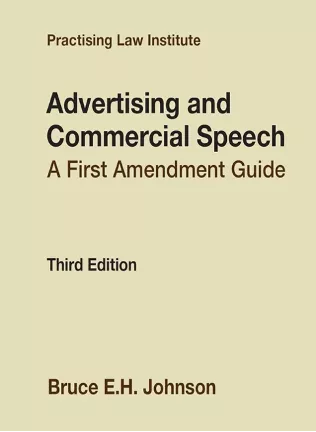
TRIBUTES
Sandra Baron
Bruce Johnson and I went to high school together. Shaker Heights High, Shaker Heights, Ohio. I suspect it would surprise no one to learn that he was a big, teddy-bear-like buddy back then. Great sense of humor. No drama. We met while working on the stage crew. The theater folks had a self-created lounge beneath the stage furnished with random props. Lumpy sofa. Lamps of unknown origin and style. Before you all get an erroneous impression, this was not a den of iniquity. But it had to be the friendliest place on 1960s high school earth. It was a place one could go for respite, friendship, the best gossip, and general bonhomie. And Bruce was a regular part of that subterranean crew.
Amazingly, when I reconnected with Bruce after I became Executive Director of MLRC, he was the same guy! And I regularly called on him as I would have in high school for support, ideas, and laughter. His energy and initiative, his incredible intelligence and creativity were turned now to law and not to backstage or underground enterprises. He had a restless energy that took him into new intellectual areas, ones that often became noteworthy. A passion for communicating with his friends, colleagues, and in some sense the world at large once social media came into his life.
I cannot adequately convey my joy in reconnecting with Bruce and having the opportunity to work with him on many projects over the years. And, to be honest, the joy of just talking to him on the array of topics friends share and enjoying his warmth and wit — we weren’t underground anymore, but the delight of his company and the value of his friendship remained the same.
Davis Wright Tremaine
In Memory of Bruce Edward Humble Johnson
It would be impossible to concisely convey the impact that Bruce Johnson had on the First Amendment or those who had the good fortune to meet him. Since he passed, his friends and colleagues have certainly tried. In hundreds of messages flooding in from around the world, it has been repeatedly affirmed that Bruce was singularly brilliant, highly respected and admired, a great and sensitive friend, a patient and humble mentor, down to earth and modest to a fault, and a true gentleman. But while each of those praises is unquestionably true, they alone cannot capture all that Bruce accomplished or what he meant to those around him and the community.
After graduating from Harvard College in 1972 and Yale Law School in 1977, Bruce found his way to Seattle where he spent his entire career — nearly five decades — at Davis Wright Tremaine. Year after year, Bruce’s dedication to advancing protections for free speech, press, and religion under the First Amendment was cemented in case law. From defending local newspapers like the Seattle Times up to the United States Supreme Court, to representing national newspapers and technology companies in cases brought in the Pacific Northwest, and supporting nonprofits at trials all over the country, Bruce became known for pushing the law forward in new and exciting ways. Dubbed the “Professor” by more than one fellow First Amendment litigator, Bruce also shared his encyclopedic knowledge of media law with anyone who sought his thoughts or counsel. Bruce helped shepherd DWT’s media practice from a regional beginning with a few lawyers to one of the largest and most respected media practices in the country.
But Bruce was never satisfied with simply advancing his career or clients; he worked tirelessly to raise the tide for everyone around him. He selflessly devoted countless hours to mentoring and developing younger lawyers, including many of the partners leading DWT’s media practice today. Bruce also was responsible for drafting (and getting enacted) numerous laws designed to protect expression, including anti-SLAPP, journalist shield and retraction laws, and held various leadership positions with the American Bar Association and Media Law Resource Center. In addition to publishing multiple law review articles and advising on the American Law Institute’s Restatement on defamation, Bruce recently wrote and released the third edition of Advertising and Commercial Speech: A First Amendment Guide. Unsurprisingly, his work earned him numerous awards over the decades, with local and national recognitions as a leader on the First Amendment.
Outside the courtroom and office, Bruce was deeply devoted to his family, friends, and local community. He loved spending time and traveling with his wife Sandra, three children, and many grandchildren, and was always much too generous with his many friends and colleagues who sought his company. Always a consummate defender of expression, Bruce naturally prized the arts as well and supported Seattle’s theater and music community by serving on the boards of the Seattle Opera, Pacific Musicworks, and Seattle Repertory Theater. Bruce was a passionate lover of opera and often attended venues with great opera around the world, usually accompanied by Sandra who also loved opera.
Throughout his life and career, it was evident to everyone who met Bruce that he cared profoundly about protecting the rights of all Americans to speak their minds, exercise their faith, and hold the government and powerful accountable for their actions. We will miss him greatly and it will take a long time to imagine a world where he is not still somewhere out there working to defend the press and the First Amendment. But mostly, we are immensely grateful for the many years we shared with him and the thought that his memory and inspiring example will live on for many generations to come.
From the Partners, Associates, and Staff at Davis Wright Tremaine LLP
Kelli L. Sager
In the hundreds of comments and pages of prose that I’ve read since I learned of Bruce Johnson’s untimely death, I was struck by how many times two words have been repeated: “brilliant” and “kind.” Both are entirely accurate, but neither are sufficient to describe him.
Bruce was brilliant, to be sure. He was a fount of knowledge on all manner of subjects, from the intellectually complex to the trivial. I’ve now read that he had a photographic memory — something he never mentioned or would have touted — but that only partly explains the encyclopedic knowledge Bruce had about, well, practically everything. The other part is that Bruce was interested in everything. He had a passion for theater, opera, and the law — but also history, geography, language, science, art — really, everything. A conversation with Bruce in which some esoteric topic had been mentioned would often be followed by an email, or another conversation, where he would share something new he had just learned from reading more about that arcane subject. He loved to share his knowledge — not in a boastful or pompous way, but with the enthusiasm of a collector exhibiting a new acquisition.
Whether it was recommending a new play that he’d seen or giving a bit of history behind a back street in London that he’d visited, or reciting the on-point footnote from some decades-old case that addressed the exact argument needed for a legal brief, he shared things from his vast internal library of information so that we all could come along for the ride. He did make it impossible to have a trivia contest at any of our firm events — everyone knew that they were playing for second place. When “Journalism Jeopardy” was introduced at the ABA Forum on Communications annual conference years ago, I marveled at how many members of the media bar — smart, successful lawyers in their own right — would elbow past each other to get a spot at Bruce’s table. He was the media bar equivalent of Ken Jennings.
And Bruce certainly was kind. It would have been easy for someone who was used to being the smartest guy in the room to patronize those around him or treat them with disdain — but that was not Bruce. He treated all of his colleagues with respect, even when dealing with disagreements about a legal approach, a firm policy, or the resolution of a conflict (which Bruce often officiated). Telling Bruce about an inappropriately nasty comment from an opposing lawyer was likely to garner nothing more from him than a shake of his head, and an understated “wow” — conveying his disappointment that the unprofessional counsel was not a more worthy adversary. If Bruce ever lost his temper, let fly a string of profanities, or slammed something down on his desk in frustration, I never witnessed it, nor did I ever hear about it.
I won’t delve into Bruce’s substantial contributions to the law; those will be the subject of more extensive discussions than I can address here. What I will most remember about Bruce, and will sorely miss, are the conversations — short and long, whether in passing or over a relaxed dinner at a restaurant he had suggested — because Bruce was not only interested, he was also interesting. So it helps for me to picture him now, sitting across a table from Cam Devore — another brilliant, kind man — trading stories, having a good laugh, and sharing a heavenly bottle of wine.
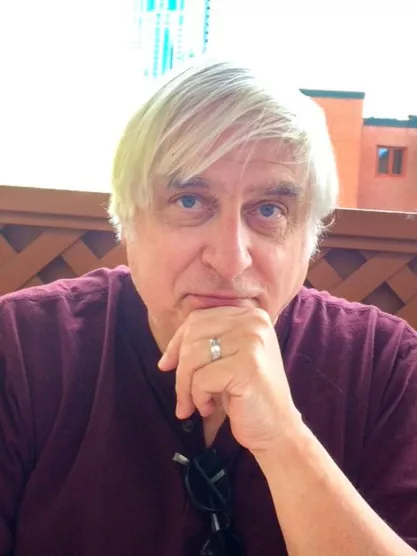
Len Niehoff
There is a point as you grow older at which life starts to feel like an exercise in perpetual loss. Somewhere in the midst of this process you realize that you cannot imagine the world without certain people in it. For me, one of those people is my friend Bruce Johnson.
I first met Bruce about forty years ago and we quickly bonded around shared interests. Not just the First Amendment, but everything from theater to current events to the intricacies of legal ethics. Bruce was a polymath of titanic proportions and every time I talked about anything with him it quickly became evident that he had thought about it better and more deeply than I had.
But there are lots of smart people around, especially in our field, and what distinguished Bruce was the kindness, the openness, and the greatness of soul that he modeled for the rest of us. Bruce showed us all, over and over again, that any inconsistency we might see between intellectual rigor and interpersonal warmth was a false and pernicious dichotomy. You could do both, and he did them brilliantly and effortlessly.
It seems appropriate to send Bruce off with a bit of Shakespeare. So this: “I shall not look upon his like again.”
Lee Levine
I first met Bruce Johnson in 1976 when I entered Yale Law School and he was a third-year student. Our interactions were brief back then but I vividly recall regarding him as a gentle giant, and a brilliant one at that.
Fast forward to 1980 when I began the practice of media law, a field in which Bruce had already established himself. He worked side by side with the great Cam DeVore, another selfless and whip-smart man. Bruce, like his mentor, set the standard for the kind of lawyer I aspired to be — collegial with no sharp elbows, principled but vigorous in their advocacy of free speech and a free press.
For more than four decades, I was privileged to call Bruce Johnson my colleague and friend, to litigate cases alongside him, and to serve with him on the faculty of the Practicing Law Institute and the board of the Media Law Resource Center’s Defense Counsel Section. For all that time, and in all those settings, he was the same person I met in 1976 — a brilliant and gentle giant. His passing leaves a hole in the media bar that will be impossible to fill.
Robert Corn-Revere
Bruce and I were partners at Davis Wright Tremaine for 20 years. He was a friend and an invaluable colleague. Bruce was an “expert’s expert” and a giant in the field of First Amendment and media law. But his expertise was exceeded only by his modesty. I never came across an issue where Bruce didn’t have the answer at his fingertips, yet he never acted like the “smartest guy in the room” — that he actually was. He was a joy both to work with and to hang out with. His passing is an incredible loss, and it is hard to believe he is gone.
Christopher Finan
I was so sorry to learn of the death of Bruce Johnson. I had the pleasure of working with him on several amicus briefs during my time at the National Coalition Against Censorship, but I didn't meet him until recently when we spent a couple of hours talking in his office in Seattle. (Among other things, we discovered that we both attended Shaker Heights High School just a few years apart.) He was very generous in suggesting things that might help NCAC and subsequently introduced us to Ambika Kumar, the co-chair of the media law practice at Davis Wright Tremaine. Ambika is now a member of the NCAC board. I am so glad to have had the opportunity to get to know Bruce.
David Skover
I knew Bruce as an inveterate First Amendment lawyer, as many did, but I was privileged to share some of his other deep interests as well. Because we both lived in Seattle, it was possible for me to involve him in First Amendment symposia at Seattle University Law School, and he always accepted my invitations to speak on our panels. No matter the topic, Bruce's commentary was riveting. He was a dynamic teacher who superbly engaged our students, faculty, and alumni on a full range of free speech issues.
Beyond that, Bruce and I shared a deep passion for opera, and I appreciated attending performances with him of the early operatic compositions by Peri, Monteverdi, and Handel, among others. He was a dedicated member of the board of the Early Music Guild (now Early Music Seattle), and he introduced me to many of its local advocates. In many respects, Bruce was a true Renaissance man, and I was fortunate to be included in his wide circle of friends and acquaintances. He will be very much missed.
2023-2024 SCOTUS term: Free expression and related cases
Cases decided
- O’Connor-Ratcliff v. Garnier
- Speech First, Inc. v. Sands (certiorari granted, judgment re: the bias policy claims vacated, and case remanded to the Court of Appeals for the 4th Circuit with instructions to dismiss those claims as moot) (Thomas and Alito, dissenting)
- National Rifle Association of America v. Vullo
- Vidal v. Elster
- Gonzalez v. Trevino (vacated & remanded, per curiam with Alito, Kavanaugh, & Jackson (joined by Sotomayor) concurring in separate opinions & Thomas dissenting)
- Murthy v Missouri (decided on Art. III standing grounds)
- Moody v. NetChoice, LLC and NetChoice, LLC v. Paxton
Review granted
Pending petitions
- Henderson v. Texas
- Murphy v. Schmitt
- Villarreal v. Alaniz
- No on E, San Franciscans Opposing the Affordable Care Housing Production Act, et al. v. Chiu
State action
- Lindke v. Freed (Barrett, J., 9-0: “The state-action doctrine requires Lindke to show that Freed (1) had actual authority to speak on behalf of the State on a particular matter, and (2) purported to exercise that authority in the relevant posts. To the extent that this test differs from the one applied by the Sixth Circuit, we vacate its judgment and remand the case for further proceedings consistent with this opinion.”)
- O’Connor-Ratcliff v. Garnier (Per Curiam: 9-0: “We granted certiorari in this case and in Lindke v. Freed (2024), to resolve a Circuit split about how to identify state action in the context of public officials using social media. Because the approach that the Ninth Circuit applied is different from the one we have elaborated in Lindke, we vacate the judgment below and remand the case to the Ninth Circuit for further proceedings consistent with our opinion in that case.”)
Review denied
- In Re First Choice Women's Resource Centers, Inc.
- Pierre v. Attorney Grievance Commission of Maryland
- O’Handley v. Weber
- Frank v. Lee
- Mckesson v. Doe (Separate statement by Sotomayor, J.)
- Brokamp v. James
- Griffin v. HM Florida-ORL (application for stay denied)
- M. C. v. Indiana Department of Child Services
- Spectrum et al v. Wendler
- Porter v. Martinez
- Molina v. Book
- Porter v. Board of Trustees of North Carolina State University
- NetChoice, LLC v. Moody
- Alaska v. Alaska State Employees Association
- X Corp. v. Garland
- Tingley v. Ferguson (Justice Kavanaugh would grant the petition for a writ of certiorari. Justice Thomas, dissenting from the denial of certiorari. (separate opinion) Justice Alito, dissenting from the denial of certiorari. (separate opinion)
- Jarrett v. Service Employees International Union Local 503, et al
- Sharpe v. Winterville Police Dept.
- Winterville Police Department v. Sharpe
- Stein v. People for the Ethical Treatment of Animals, Inc., et al.
- Blankenship v. NBCUniversal, LLC
- Center for Medical Progress v. National Abortion Federation
- Frese v. Formella
- Mazo v. Way
Free speech related
- Miller v. United States (judgment vacated, and case remanded) (statutory interpretation of 18 U.S.C. § 1512(c) advocacy, lobbying and protest in connection with congressional proceedings)
- Fischer v. United States (vacated and remanded, 6-3 per Roberts with Barrett, Sotomayor and Kagan dissenting: To prove a violation of §1512(c)(2), the Government must establish that the defendant impaired the availability or integrity for use in an official proceeding of records, documents, objects, or other things used in an official proceeding, or attempted to do so.)
Last scheduled FAN
This article is part of First Amendment News, an editorially independent publication edited by Ronald K. L. Collins and hosted by FIRE as part of our mission to educate the public about First Amendment issues. The opinions expressed are those of the article’s author(s) and may not reflect the opinions of FIRE or Mr. Collins.
Recent Articles
FIRE’s award-winning Newsdesk covers the free speech news you need to stay informed.
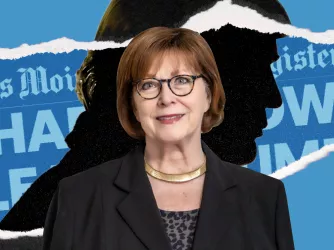
FIRE’s defense of pollster J. Ann Selzer against Donald Trump’s lawsuit is First Amendment 101

China’s censorship goes global — from secret police stations to video games

High schoolers: Become a voice for tomorrow, today!
